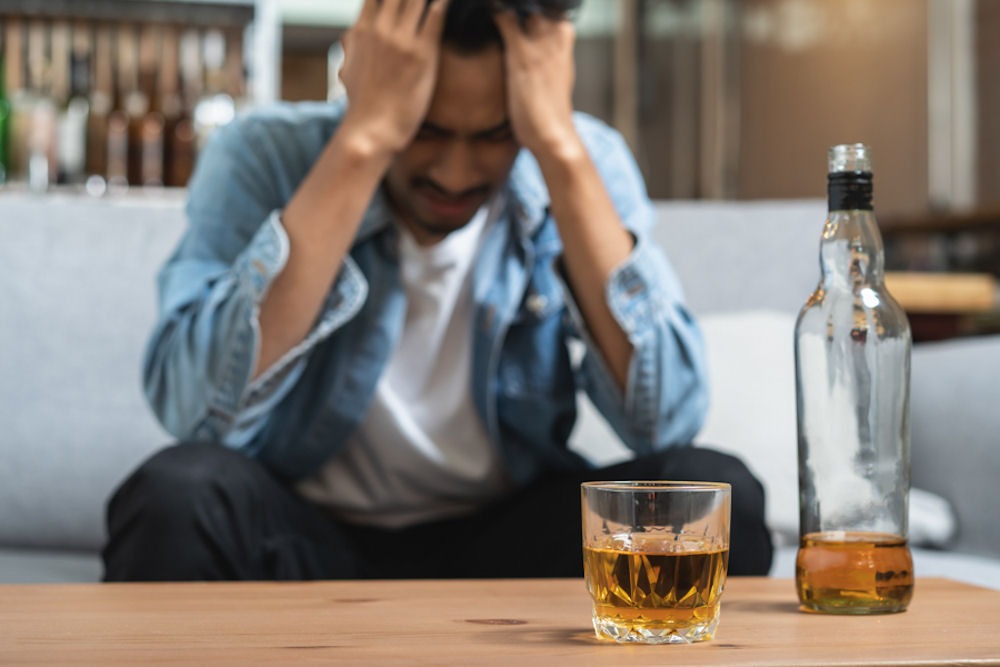Alcohol hallucinosis is a rare but serious condition caused by chronic and heavy alcohol consumption. Unlike delirium tremens, another alcohol-related complication, alcohol hallucinosis specifically involves auditory, visual, or tactile hallucinations without significant confusion or clouding of consciousness. Understanding this condition can be vital in addressing alcohol-related mental health challenges and seeking timely treatment.
Free By the Sea offers alcohol detox and residential treatment to help you stop drinking. Call us for an assessment and learn about the next steps for treatment.
What Are Alcohol Hallucinations?
Jump to Section
Alcohol hallucinations are sensory perceptions that occur without external stimuli, often as a direct result of excessive and prolonged alcohol consumption. These hallucinations are typically auditory but can also be visual or tactile. Individuals may hear voices, see objects or people that are not present, or feel sensations on their skin.
Auditory hallucinations are the most common, often described as hearing threatening or accusatory voices. Visual hallucinations might involve seeing distorted or nonexistent images, while tactile hallucinations could include sensations of bugs crawling on the skin. These experiences are vivid and can feel real, causing significant distress and confusion.
Unlike psychotic disorders such as schizophrenia, individuals experiencing alcohol hallucinosis remain aware that the hallucinations are not real. This awareness distinguishes alcohol hallucinosis from other psychotic conditions. Prompt recognition and treatment are critical to managing symptoms effectively and preventing complications.
What Are the Signs and Symptoms of Alcohol Hallucinosis?

Alcohol hallucinosis typically manifests within 12 to 24 hours of heavy drinking cessation and can last for days. Key symptoms include:
- Auditory Hallucinations: Hearing voices or sounds that are not present. The voices are often accusatory, derogatory, or threatening, intensifying anxiety.
- Visual Hallucinations: Seeing shapes, people, or objects that are not there. These images can range from fleeting shadows to detailed figures.
- Tactile Hallucinations: Experiencing sensations such as bugs crawling on the skin or other abnormal physical feelings.
- Anxiety and Agitation: Heightened fear or unease often accompanies hallucinations, making the experience more distressing.
- Sleep Disturbances: Difficulty falling or staying asleep due to intrusive hallucinations or anxiety.
- Paranoia: A sense of being watched or followed, which can lead to defensive or erratic behavior.
Symptoms can vary in intensity depending on the individual and their drinking history. Recognizing these signs early is crucial for preventing the condition from worsening and avoiding more severe complications.
What Are the Risk Factors for Alcohol Hallucinosis?
Several risk factors increase the likelihood of developing alcohol hallucinosis, including:
Chronic Alcohol Abuse
Prolonged and excessive alcohol consumption is the leading cause of alcohol hallucinosis. Over time, heavy drinking damages the brain and nervous system, increasing the likelihood of hallucinations. Chronic abuse also disrupts neurotransmitter function, which can lead to vivid sensory distortions.
Binge Drinking
Episodes of consuming large amounts of alcohol in a short time can overwhelm the body’s ability to process alcohol safely. This pattern can trigger acute withdrawal symptoms, including hallucinations when drinking suddenly stops. Binge drinking also heightens the risk of brain chemical imbalances, contributing to hallucinosis.
Mental Health Disorders
Individuals with co-occurring mental health conditions such as anxiety, depression, or schizophrenia are more vulnerable to alcohol hallucinosis. Alcohol is often used as a coping mechanism, but it can exacerbate underlying mental health issues and trigger hallucinations during withdrawal.
Family History
A genetic predisposition to addiction or mental health disorders can increase the risk of developing alcohol hallucinosis. Those with a family history of alcoholism or psychiatric conditions may inherit vulnerabilities that make them more prone to severe withdrawal symptoms.
Previous Episodes
Individuals who have experienced alcohol hallucinosis or other severe withdrawal symptoms before are at higher risk of recurrence. Each episode can lower the threshold for future occurrences, making it crucial to seek professional help to break the cycle.
Nutritional Deficiencies
Chronic alcohol abuse often depletes essential nutrients like thiamine (vitamin B1), which is vital for brain health. Deficiencies can cause neurological damage, increasing the likelihood of hallucinations and other withdrawal complications.
Alcohol Hallucinosis vs. Delirium Tremens
While alcohol hallucinosis and delirium tremens (DTs) are both associated with chronic alcohol abuse, they are distinct conditions with different symptoms and outcomes:
Onset: Alcohol hallucinosis typically begins within 12 to 24 hours of heavy drinking cessation, while DTs often emerge 48 to 72 hours after the last drink.
Consciousness: Individuals with alcohol hallucinosis retain clear consciousness and awareness, whereas those with DTs often experience confusion, disorientation, and altered mental status.
Symptoms: DTs involve severe physical symptoms such as high fever, rapid heart rate, seizures, and severe agitation, alongside hallucinations.
Duration: Alcohol hallucinosis can last for hours to days, while DTs can persist for several days and are potentially life-threatening.
Both conditions require medical attention, but DTs are considered a medical emergency due to the high risk of severe complications, including death.
Diagnosis and Treatment of Alcohol Hallucinosis
Diagnosing alcohol hallucinosis involves a thorough medical history, physical examination, and psychological evaluation. Key steps include:
- Medical History: Assessing the individual’s alcohol consumption patterns and any history of withdrawal symptoms.
- Physical Examination: Evaluating for signs of alcohol-related damage, such as liver disease or neurological impairment.
- Mental Health Assessment: Identifying co-occurring mental health conditions or distinguishing alcohol hallucinosis from other psychiatric disorders.
Treatment Options

Treatment focuses on managing symptoms, preventing complications, and addressing underlying alcohol dependence. At Free by the Sea, we offer comprehensive care that encompasses detox, residential, and outpatient treatment, ensuring individuals receive the support they need at every stage of recovery.
Medical Detoxification
Medical detox is the first and crucial step in treating alcohol hallucinosis. This process involves safely withdrawing from alcohol under medical supervision to prevent severe withdrawal symptoms. At Free by the Sea, our detox program includes the use of medications to alleviate discomfort and reduce the risk of complications like seizures. This ensures a stable start to recovery in a safe and supportive environment.
Medication
Medications such as antipsychotics or benzodiazepines are often prescribed to manage hallucinations, agitation, and anxiety during the withdrawal process. These medications help stabilize mental and emotional health, making it easier for individuals to transition into long-term treatment. Free by the Sea’s team of medical professionals carefully monitors and adjusts medications to suit each client’s unique needs.
Therapy
Behavioral therapies, including cognitive-behavioral therapy (CBT), are essential for addressing the root causes of addiction and developing healthier coping mechanisms. Therapy sessions help individuals understand the triggers and patterns behind their alcohol use. At Free by the Sea, we incorporate evidence-based therapeutic approaches to empower clients to take control of their recovery journey.
Nutritional Support
Chronic alcohol abuse often leads to significant nutritional deficiencies, particularly in thiamine (vitamin B1). Addressing these deficiencies is vital for neurological recovery and overall well-being. Free by the Sea provides nutritional support and guidance as part of our holistic treatment approach, ensuring clients rebuild their physical health alongside their mental health.
Long-term Rehabilitation
Successful recovery requires ongoing support through residential or outpatient programs. At Free by the Sea, we offer both options to meet clients where they are in their journey. Our residential treatment provides a structured, immersive environment for those needing intensive care, while our outpatient programs offer flexibility for clients transitioning back to daily life. Both options focus on relapse prevention, life skills development, and building a strong foundation for sustained sobriety.
At Free by the Sea, we offer comprehensive care, including detox, therapy, and dual diagnosis treatment, to support individuals through recovery from alcohol hallucinosis.
Can Alcohol Hallucinosis Be Prevented?
Preventing alcohol hallucinosis begins with addressing the root cause: excessive alcohol consumption. Here are some strategies:
- Limit Alcohol Intake: Reducing or avoiding alcohol can prevent the condition from developing.
- Seek Help Early: Engaging in treatment programs for alcohol dependence can address the issue before complications arise.
- Manage Co-occurring Conditions: Treating mental health disorders can reduce the risk of alcohol abuse and its consequences.
- Build a Support System: Surrounding oneself with supportive friends, family, or peer groups can encourage healthier habits.
- Regular Health Checkups: Monitoring physical and mental health can help identify and address early signs of addiction.
Education and awareness are critical in preventing alcohol-related conditions, including hallucinosis. Recognizing the risks and seeking help early can make a significant difference.
Free by the Sea Offers Alcohol Addiction Treatment in WA

At Free by the Sea, we understand the challenges of overcoming alcohol addiction and its associated conditions, such as alcohol hallucinosis. Our full continuum of care is designed to meet individuals where they are in their recovery journey and guide them toward a healthier future.
We believe in a personalized approach to care, tailoring treatment plans to each individual’s needs. At Free by the Sea, our compassionate team is committed to helping clients achieve long-term recovery and reclaim their lives from alcohol addiction. If you or a loved one is struggling, don’t wait—reach out to us today.

Dr. Richard Crabbe joined our team in 2019 as our psychiatrist and medical director. He attended the University of Ghana Medical School where he became a Medical Doctor in 1977. From 1978 through 1984, he was a medical officer in the Ghana Navy and provided a variety of services from general medicine to surgeries. He received his Certificate in General Psychology from the American Board of Psychology and Neurology in 2002.

 December 30th, 2024
December 30th, 2024










